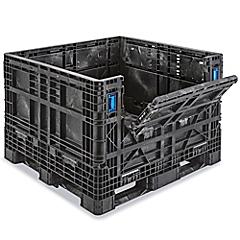A complete guide to choosing the right Bulk Plastic Containers for your business
A Comprehensive Overview to the Various Kinds Of Bulk Plastic Containers Available Today
Bulk plastic containers play an essential role in various sectors, supplying options for storage and transportation. Their diverse types satisfy various requirements, from stiff options for solid products to adaptable containers fitting different shapes. Each kind provides unique benefits, making it important to understand their attributes and applications. As sectors advance, so do the needs for effective container services. What variables should one think about when selecting the right bulk container?
Review of Mass Plastic Containers

Kinds of Mass Plastic Containers
Bulk plastic containers can be found in different forms, each fit to particular applications. Inflexible mass containers, flexible bulk containers, and intermediate bulk containers stand for the key classifications, each offering one-of-a-kind advantages. Recognizing these kinds is important for choosing the best container for carrying and saving materials.

Rigid Mass Containers
Rigid bulk containers are essential for reliable storage and transport of various materials across sectors. These containers are typically constructed from resilient plastics, permitting them to withstand extreme handling and environmental conditions. They come in different sizes and shapes, including containers, drums, and totes, making them ideal for storing every little thing from granular materials to fluids. Rigid containers typically feature reinforced walls and protected covers, making sure the materials stay secured during transit. Their stackable design maximizes storage room, making them ideal for warehouses and making centers. Additionally, many rigid bulk containers are recyclable and recyclable, adding to sustainability initiatives. Overall, their robustness and convenience make inflexible bulk containers an essential component in supply chain operations.
Versatile Bulk Containers
Adaptable bulk containers, frequently referred to as flexible intermediate mass containers (FIBCs), serve as a functional service for saving a range and moving of completely dry materials. These containers are generally made from woven polypropylene and are created to be light-weight yet strong, permitting reliable handling and stacking. Their flexibility allows them to suit numerous forms and dimensions, making them suitable for items ranging from grains to chemicals. FIBCs can be outfitted with attributes such as spouts for very easy filling and discharge, as well as protective coatings for boosted resilience. Furthermore, they are recyclable and multiple-use, contributing to sustainable methods in industries like farming, food handling, and building. Overall, adaptable mass containers offer a economical and reliable option for mass product monitoring.
Intermediate Bulk Containers
Intermediate bulk containers (IBCs) are important for the reliable transport and storage space of fluids and granular materials throughout different industries. These containers generally have a capacity ranging from 275 to 330 gallons and are created for very easy managing and piling. Made from durable materials like high-density polyethylene or steel, IBCs supply exceptional security against contamination and environmental aspects. Their design includes attributes such as an integrated pallet for forklift gain access to and a removable top for simple filling and cleansing. IBCs are commonly made use of in chemical, food, and pharmaceutical markets, making certain conformity with security regulations. Their flexibility and reusability make them a cost-effective solution for mass storage space and transportation, contributing to supply chain efficiency and sustainability.
Attributes and Benefits of Mass Plastic Containers
Bulk plastic containers are vital devices in different industries, offering a mix of sturdiness and usefulness. These containers are constructed from high-quality products, making them immune to impacts, chemicals, and environmental elements. This robustness warranties product security throughout storage space and transport.
Additionally, mass plastic containers are lightweight, helping with simplicity of taking care of and reducing delivery prices. Their stackable design optimizes storage effectiveness, enabling enhanced storage facility room. Lots of designs include secure lids or closures, providing an airtight seal that avoids and preserves components contamination.
Mass plastic containers are typically reusable and recyclable, adding to sustainable methods. Their adaptability enables a variety of applications, from food storage space to industrial use, boosting their worth across industries. Services take advantage of the long lifespan and reduced maintenance demands of these containers, making them a cost-effective remedy for both lasting and short-term needs.
Industries That Utilize Bulk Plastic Containers
Numerous industries profit from making use of bulk plastic containers, each leveraging their special residential properties for particular applications. The food and beverage market depends on these containers for safe storage and transportation of items, while the chemical production industry uses them for handling unsafe materials. In addition, the pharmaceutical circulation needs stress the importance of toughness and cleanliness in product packaging solutions.
Food and Beverage Market
As the need for risk-free and effective storage space services continues to climb, the food and beverage sector increasingly relies on mass plastic containers for their functional requirements. These containers give durable, lightweight, and functional alternatives for saving active ingredients, ended up products, and waste products. Made from food-grade materials, they ensure compliance with health and safety and security criteria. Different layouts, such as stackable bins and tote boxes, optimize space during transportation and storage space, improving logistical efficiency. Additionally, the openness of some mass containers enables for easy inventory monitoring, minimizing the threat of spoilage. With the industry's concentrate on sustainability, several manufacturers are now using recyclable and reusable choices, aligning with environmentally friendly techniques while satisfying the high needs of food safety and hygiene.
Chemical Manufacturing Sector
The chemical production field relies greatly on mass plastic containers for the reliable and safe storage of resources, intermediates, and finished products. These containers are developed to stand up to numerous chemicals, guaranteeing that harmful products do not leak or weaken the container itself. Common types consist of high-density polyethylene (HDPE) and polypropylene containers, which provide outstanding chemical resistance and toughness. Their light-weight nature and stackable style promote transportation and storage, enhancing space in producing centers. Furthermore, many bulk plastic containers include functions such as tamper-evident seals and easy-to-read labeling, improving safety and security and conformity with market guidelines. click here for info On the whole, mass plastic containers are indispensable to the chemical manufacturing process, providing reliable remedies for managing varied materials.
Pharmaceutical Distribution Needs
Drug circulation counts on mass plastic containers to satisfy rigid safety and governing requirements. These containers are crucial for carrying and storing a selection of pharmaceutical items, including active pharmaceutical active ingredients (APIs) and completed medications. Their style assurances security versus light, wetness, and contamination, maintaining the integrity of sensitive materials. In addition, bulk plastic containers are certified with market standards such as Good Production Practices (GMP) and are usually made from products that are FDA-approved. The usage of these containers improves performance in the supply chain, permitting secure, large distribution while decreasing waste. Companies in the pharmaceutical sector focus on using durable, leak-proof, and tamper-evident containers to guarantee product safety and high quality throughout the logistics process.
Considerations for Picking the Right Container
When picking the appropriate bulk plastic container, different elements must be meticulously evaluated to assure excellent capability and safety and security. The nature of the products to be kept is critical; compatibility with the container's product can influence integrity and safety and security. Bulk Plastic Containers. Furthermore, the container's shapes and size need to line up with the storage space and transport requirements, guaranteeing efficient room use
Tons ability is one more essential factor to consider, as it needs to suit the weight of components without danger of damage or failing. The style attributes, such as airing vent or lids, can affect functionality and accessibility. Conformity with industry laws is vital, specifically in sectors like drugs, where safety requirements are stringent.
The expected life-span and sturdiness of the container ought index to be analyzed to validate it fulfills the functional requirements without regular substitute. By evaluating these aspects, one can select the most appropriate mass plastic container for specific applications.
Environmental Effect and Sustainability
As organizations significantly prioritize sustainability, the environmental impact of mass plastic containers has actually come under scrutiny. These containers, frequently made from products such as polyethylene or polypropylene, add greatly to plastic waste otherwise taken care of correctly. Their manufacturing involves the consumption of nonrenewable fuel sources, which can lead to increased greenhouse gas discharges. Improvements in recycling innovation and the development of biodegradable options are assisting to mitigate these concerns.
In addition, several manufacturers are taking on techniques that stress using recycled products, therefore minimizing the demand for virgin plastics. The longevity of mass plastic containers also contributes; they are created to be recycled several times, which can reduce their overall environmental impact when compared to single-use alternatives. Inevitably, the market faces the difficulty of stabilizing functionality with environmental responsibility, making lasting practices necessary for the future of bulk plastic containers.
Ideal Practices for Storage Space and Transportation
Effective storage and transport of mass plastic containers substantially affect both operational effectiveness and sustainability. To make best use of space, companies need to stack containers securely, assuring stability and preventing damage. Proper labeling is vital for easy recognition, which simplifies access procedures. In addition, preserving a tidy and organized storage space location minimizes the risk of contamination and boosts safety and security.
For transportation, selecting the right automobile is important; containers need to be safeguarded to prevent moving during transportation. Business ought to also consider utilizing pallets to assist in much easier loading and dumping. Regular evaluations of containers for wear and tear can stop pricey substitutes.
Temperature control is an additional essential facet, as severe problems can endanger the stability of the plastic. Training workers on best techniques for handling and transportation guarantees conformity and advertises a culture of safety. By executing these ideal practices, services can improve their functional efficiency while adding to environmental sustainability.
Frequently Asked Inquiries
Exactly how Do I Clean Mass Plastic Containers Properly?
To tidy mass plastic containers successfully, one ought to wash them with warm water, utilize a moderate detergent and scrub with a soft brush. Rinse completely, then allow to air dry totally prior to storage or reuse.
What Is the Life Expectancy of Mass Plastic Containers?
The lifespan of bulk plastic containers commonly ranges from 5 to one decade, depending on the material, usage, and ecological problems. Appropriate maintenance and storage can greatly prolong their use and toughness in time.
Can Mass Plastic Containers Be Customized?

Do Bulk Plastic Containers Have Warranty Options?

Are There Laws for Utilizing Bulk Plastic Containers?
Yes, policies exist for utilizing mass plastic containers, mainly focused on safety and security, ecological impact, and material conformity. These regulations guarantee that containers meet industry standards and are ideal for transferring various materials safely and successfully.
Stiff bulk containers, adaptable mass containers, and intermediate mass containers represent the main categories, each offering distinct benefits. Adaptable mass containers, typically referred to as versatile intermediate mass containers (FIBCs), serve as a versatile remedy for keeping a range and moving of completely dry materials. The chemical production market depends heavily on mass plastic containers for the secure and efficient storage of raw products, intermediates, and ended up products. plastic bulk containers. These containers are made to stand up to numerous chemicals, making sure that unsafe materials do not leakage or deteriorate the container itself. Furthermore, bulk plastic containers are compliant with market criteria such as Great Manufacturing Practices (GMP) and are often made from products that Our site are FDA-approved